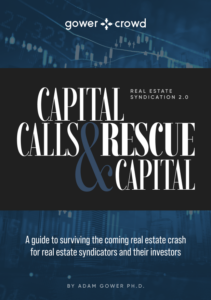6 Keys to Crowdfunding Real Estate
The Internet is transforming how capital is raised across the commercial real estate industry. A 2012 change in federal law allowed real-estate developers to advertise to the general public to raise capital. And that means sponsors can now turn to the most potent tool of modern marketing: The Internet.
Specifically, real estate entrepreneurs can now use the most sophisticated of Internet marketing systems to raise capital, and that means reaching millions of potential investors with your message with the stroke of a keyboard.
But how do you compete?
Crowdfunding has great potential — but only if you adapt tried-and-true marketing techniques to the new digital platforms. After all, your website may look great, but you’ll be competing with a billion websites for the attention of your potential investors. The question becomes: How is your voice going to be heard in all that commotion?
Get access to our FREE weekly newsletter exclusively covering the latest updates from the real estate crowdfunding world
Crowdfunding is marketing
Getting noticed is what online capital formation is ultimately about and there are two things that work in favor of real estate developers.
One, real estate is tangible unlike stocks or bonds – investors can physically see a piece of real estate, can touch it and feel it (so to speak) and can see pictures of it online. When potential investors see a real estate proposal, they can readily come to an intuitive understanding of it. After all, everyone has a relationship to real estate in one form or another, maybe as a tenant, maybe as a landlord. And that facilitates their being more open to your message.
Second, digital crowdfunding requires taking a risk by putting your idea out there. But real estate professionals are inherent risk-takers. It’s the nature of the business, so it makes sense that real estate developers are a natural fit for the digital space.
Already, many real estate deals have taken to the Internet to raise capital for projects with great success. From the six-figure single-family flip to the eight-figure commercial project, real estate professionals have demonstrated again and again the viability of online capital formation.

Six keys to crowdfunding real estate deals
But don’t be mistaken into thinking that all you need to do is to throw up a website advertising your project and equity capital will just start flowing in through your doors. There is a lot of work involved migrating from the analogue world of in-person meetings to the digital world of social media and content marketing. Luckily, once you have built your digital marketing machine it becomes an asset to your company, drawing in investors and raising capital on auto-pilot.
Here are six key ideas to launching a successful digital marketing campaign:
1. Remember, it’s still marketing.
Is the old way of raising money face-to-face different from doing it online? Not really. In essence they’re the same, only in a different format – in the analogue world you have to repeat the process again and again, whereas in the digital space you record your analogue pitch, and it then it does the work for you. Commit your in-person message to the digital world and you’ll never have to pitch a deal again.
2. Relationships still matter.
Before crowdfunding, you’d meet people in person to pitch a deal. The first thing you’d talk about is: Who am I? Who are you? You’d get to know each other. Over time, the potential investor would get to know you and come to like you and eventually trust you enough to send you a check if the numbers make sense. Online, it's the exact same thing. You still have to establish a relationship with a prospect – but it’s a lot easier to do online than in-person.
3. Success begets success.
If things go well on your first deal, and things go well on the second, by the time you get to a third, investors will be ready to sign contracts and wire money as soon as your next deal goes live.
4. Fear Of Missing Out (FOMO).
Everyone wants to jump on something that they see other people jumping on. There's a natural tendency to pursue opportunities that are popular and yet limited in availability – it’s a characteristic of the investment mentality. Make sure your presence is known, and always include a measure of scarcity in your offerings.
5. Crowdfunding is good for everyone.
Online capital formation has democratized the industry and that’s as good for investors as much as it is for developers. Developers now have access to a broader range of potential capital, and for investors it no longer matters where they live, who their father was, where they went to school. Ordinary Americans now have access to great deals.
6. Be authentic.
When you really believe in something and are enjoying what you do, it makes for a convincing message. It affects people. Being authentic in who you are and what you believe and what you're passionate about — it's compelling online.
There’s only upside
The internet drives out inefficiencies in markets. Before it was legal to solicit investors online, the market for raising capital for $100,000 deals was extremely inefficient. Even the world of $10 million deals was inefficient because in both cases it was difficult for developers to find investors and information was hidden behind closed doors.
Only the institutional real estate world was and remains efficient because everyone at that level knows who all the players are. Everyone has access to the same information and they had access to all the necessary information to make fully informed decisions. They are experts inhabiting a small world of other experts where there is transparency and shared knowledge.
Now that the laws have changed, capital formation has been democratized at the lower dollar levels by opening up information sharing and transparency to even the smallest of projects. Crowdfunding brings similar efficiencies to middle and smaller sized deal that only before existed at the billion-dollar level – so get your marketing systems in place and join the party; it’s still a blue ocean opportunity!
If you have only just started in real estate development, have completed no deals, have no email list, but know you want the freedom and wealth being a real estate developer brings, then I suggest your first step is to start evaluating deals so you can recognize a good one when you see it.
Here’s where you should start. You’ll learn everything you need to know – the different types of real estate, different development strategies, how real estate cycles influence the market, and all about due diligence.
If you want to find deals and raise money for them so you can start your real estate development business, then learning how to conduct due diligence so you can pitch your deals better to investors is a great place to start.
If you’ve already purchased one or more real estate project and are seeing more opportunities than you can finance, then now is the time to start building your investor network so you can finance all your next deals quicker.
You’ve already got some momentum; now start finding and educating prospects about what you’re doing so you can build an email list of people to pitch to when you’re ready to raise money for your next deal.
This is what we build for private clients all the time – it’s called the Investor Acquisition System and you can access the entire program right here so you can find prospects, and convert them into being deep pocketed, repeat investors in your deals.
If you are a seasoned pro with multi-cycle experience, a substantial portfolio, a decent deal pipeline, and find yourself spending too much time raising equity capital because you’re still doing it in-person, then it’s time you put technology to work for you.
The wonderful thing about doing this is that you’re not going to be doing anything different than you’re already doing and, guess what, you’ll never have to sit through investor meetings again.
Sounds crazy I know, but I lay the whole thing out for you in this white board workshop where I personally show you exactly what it takes for you to transform your equity raising into a fully automated, capital raising machine so you can find new investors while increasing commitments from your existing network.






